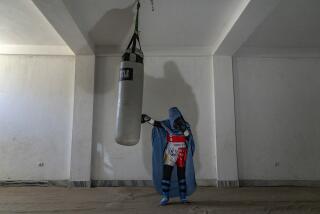Soccer opens up a new world to an American living in Afghanistan
The first time Nick Pugliese’s mother wondered if her only son had lost his mind was when he announced he was going to work for a telecommunications company in Afghanistan.
The day she was sure of it came last spring, when Nick called from Kabul to say he was quitting that job and leaving the secure compound where he lived to rent a room in a ramshackle boarding house so he could play professional soccer in the Kabul Premier League.
“I was, like, ‘You’ve got to be kidding me,’” his mother, Kim Pugliese, recalled. “I was speechless. That can’t really be happening. Then I realized it was and it wasn’t really going to be my decision.”
Nine months later, with Nick back home in Rochester, N.Y., for the holidays, the Pugliese family remains divided over the wisdom of his decision. What’s indisputable, though, is that while it caused his parents no end of sleepless nights, the decision also launched Nick on a mind-opening adventure that enabled the 23-year-old to become the first American to play pro soccer in Afghanistan since the U.S. invasion 12 years ago.
“Playing soccer for a living is thrilling and something I’ll never have the chance to do elsewhere,” Pugliese wrote in an email interview from the Afghan capital. “My day-to-day life is incomparably more colorful than living behind compound walls. Having had to look out for myself, I’ve matured.
“A rare opportunity presented itself. I took it, and I now have friendships and memories I would never have had.”
That wasn’t exactly what Pugliese was looking for when he took an eight-week internship with the Afghan firm Roshan Telecommunications, in 2012. Pugliese had just graduated with a 3.9 GPA and degrees in political science and philosophy from Williams College in Massachusetts, where he was also captain of the soccer team. But he accepted both the internship and the job offer that followed because he wanted experience working in an emerging market.
He also believed in the project he was assigned to — a mobile phone application that enabled customers to transfer money from one part of the country to another. What he hadn’t counted on, though, was a stifling lifestyle that forced him to live behind closed doors protected by armed guards and allowed to venture out only to a short list of about 20 preapproved locations in Kabul, a city of about 3.5 million.
“It’s difficult to overstate how suffocating life on a compound with 75 co-workers — all foreigners — can be at times,” Pugliese said. “It was very difficult for me to find healthy outlets and escape boredom. I went to the gym religiously, but that wasn’t enough.”
Six months into his stay, Pugliese begged his supervisors to let him play in an amateur soccer league twice a month. They reluctantly agreed, but permission to practice between games in Kabul’s main stadium was quickly denied.
“Football was first and foremost an escape at that point,” he said. “Soccer helped keep me mentally balanced.”
With Roshan blocking any attempt at compromise, Pugliese said, he slipped out of the compound to train with Ferozi FC, a professional club in the 14-team Kabul Premier League. The level of play was similar to that of an NCAA Division III league, the level Pugliese had excelled at in college, so he was immediately comfortable. And by mid-April, Ferozi had become so impressed, it offered the American a contract.
Accepting it would mean leaving his job, which paid him $3,000 a month plus room, board and security, for a $300 monthly salary and a room in a residential complex.
Pugliese couldn’t say yes fast enough.
And with him in the lineup as a defensive midfielder, Ferozi won last spring’s Kabul Cup, then made it to this fall’s league final before losing, 1-0, in last week’s title game.
“It was admittedly a rash decision,” he recalled. “But one that I needed to do for myself at that point. My lifestyle changed dramatically. I instantly was interacting with a whole new set of people.”
His parents worried that their son, without his security detail, would become an easy target for terrorist groups looking to raise their profile by kidnapping or even killing an American.
“How do you trust them?” Kim Pugliese, an intellectual property and finance consultant in Rochester, said of her son’s Ferozi teammates. “How do you know this is real? And going over to these guys’ houses and stuff. Are you nuts?
“That’s not what he sees. He’s so trusting. I was like, ‘Wake up, Nick!’”
Pugliese was aware of the danger, so he varied his daily routine, traveled in a group as often as possible and, like most Afghan men, wore a scarf in public. But rather than betraying him, Pugliese’s new teammates closed ranks around the American, soccer having melted away whatever political or social mistrust they may once have held.
“The first time I met him he was a really good guy, not arrogant,” Ferozi defender Masood Hashemi said through an interpreter. “Then we became really good friends. If I scored a goal, Nick was the first guy I was going to see.
“Most Afghan people think that Americans are bad. I have a really good opinion of Americans.”
Pugliese said his immersion in the Afghan culture changed some of his perceptions as well, and he has chronicled his experiences in a lively blog titled Nick Plays Football in Kabul (tumblr.footballinkabul.com). Over the last six months he’s expanded his soccer diplomacy by joining the daily games of pickup futsal — a smaller version of soccer — at a local park. Two months ago he began filming some of the people he met.
Having arrived back in Rochester on Thursday, Pugliese plans to edit that footage in the hopes of assembling a documentary that will show the Afghanistan he saw — a side he said most Americans know little about. He is also thinking about writing a book about his experiences.
“Sports in general and soccer in particular can be useful in lessening hostilities, while at the same time acknowledging that many hostilities run deep,” he said. “In the same way that I’ve learned a lot positive about Afghanistan through soccer, I suppose that some friends may now have a different opinion of Americans following our friendship.”
When — or even if —- he renews those friendships by returning to Afghanistan is uncertain. He’s been offered a non-playing job with the newly formed Afghan Premier League as well as an on-field tryout with an APL team, offers he’s still mulling over.
Only this time he’s promising the decision won’t be his alone, which is something else he learned in Afghanistan.
“Afghanistan has taught me to slow down and appreciate those people and things in front of me. It’s not lost on me the idea that I’ve had to come to the other side of the world to be taught a stern lesson about the importance of family, “ he said.
“I am personally interested. But this will have to be a family decision. I have put my family through enough stress already.”
Twitter: @kbaxter11







